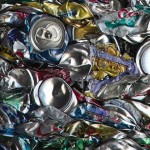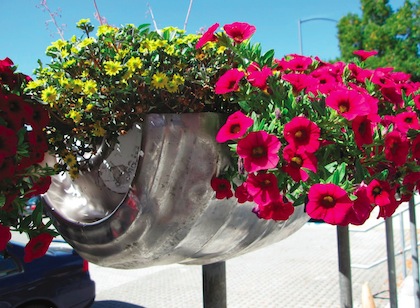Beer Around the House…and Garden?
Put Your Beer To Work Thinking Outside the Glass
We’re so used to beer in our glass that it’s worth giving pause to consider how useful beer can be outside of the glass. Besides providing enjoyable nourishment, beer can be a useful tool around the house and garden. If you’ve ever been had to figure out what to do with leftover or undesirable beer, we have some solutions. Here they are:
Beer Around the Garage and Workshop
If you like to putter around, then you may be spending a good amount of time in the workshop and garage. Besides enjoying a beer when you’re putzing around, here are some ideas for using beer as a tool in your kit.
Flying Bug Catcher. If you like to work free of flying insect, then setting up a trap may be a solution for your workshop and garage. Many bugs are attracted to the smell of beer and you can construct a simple one-way in, noway out trap for flying insects. Punch holes in a metal-lidded jar or plastic lidded tub just large enough for winged insects to get inside. Pour beer into the container deep enough to drown the bugs and replace the lid. The insects will climb in and be unable to escape, creating a no-fly workshop zone for you.
Polish. Beer is an effective polish for metals and surfaces. Dampen a rag with beer and rub down the surface of choice. In some cases you may want to rinse the surface with clean water when you’re done. In other instances you don’t need to rinse the beer from the surface, for example if you are scrubbing garden pots. . Keep in mind that rinsing will help keep critters away from the finished project as well as keep it from being sticky to the touch. The residual sugars in beers will be attractive to our small multi-legged friends so rinse them completely if you’re not interested in making new friends.
Soaking. Do you have an old coffee can or catch-all containers of assorted screws, nuts, bolts and washers? Beer can help dissolve or soften the rust if you want to salvage those priceless project parts. The acidity of the average beer will help eat away at rust that has developed on metal parts and pieces. If the beer you’re using is still carbonated, thee CO2 will assist in the release of the rusty particles. Pour beer into a watertight container, place the pieces in the beer and set your timer for an hour. Stirring or shaking the pot a few times during their bath will help agitate the parts and get beer into more nooks and crannies to do its work.
Beer Around the Yard and Garden
Bait. Okay,so let’s get the ubiquitous slug bait tip out of the way. If you’ve got slugs you want to eliminate, pour some beer in a shallow dish that slugs can climb into but not out of. While we’re not extolling total extermination, this is a non-offensive and non-chemical solution to help cut back on slug damage to your plants. You can then pour the sluggy beer into a compost pile to return them to the earth cycle safely. Other bugs and multi-legged creatures may enter into this one way-agreement as well so be prepared to see other critters who find the smell of beer irresistible.
Compost. Composting is soooooo easy and smart that anyone can do it and everyone should consider it. Beer has so many nutrients that adding it to your compost pile helps return that goodness to the earth. There are many ways to easily compost, the most popular being outdoor traditional methods or vermiculture, which uses worms to recycle your food wastes. There are plenty of sites online to explore ideas for your particular setting. You can then compost the beer because healthy compost needs moisture and wetness. Just don’t over beer it–too much liquid content can kill the compost.
Beering, aka Watering. Like us, plants need plenty of water to survive. One way to use that beer you don’t intend to drink is to water plants. Since beer is food safe as well, you can easily use it to give highly nutritious liquid to plants that bear food and make our yards beautiful. Keep in mind that critters may be attracted to the beer and its smell. Diluting the beer in other waters or liquids you generate can be a smart solution to greatly reducing the attraction.
Beer Around the House & Apartment
Beer can help you. Outdated or unappealing leftovers can be recruited for use in other ways.
Cooking. Beer of every variety and style can be used in cooking. One of my very favorite tips is to freeze unused beer in ice cube trays or small containers that are freezer sturdy. If you freeze beer in ice cube trays, crack the tray once they’re completely frozen and put them in a labeled freezer container. When you reach for the beer cubes to cook with, simply select the number and style you want. Each cube equals roughly 2 tablespoons of liquid. If you want to be particular and know specific yield, help yourself by measuring the liquid volume of the tray or container before pouring the beer into it. Freezing this leftover beer will provide some excellent moisture and flavors in your cooking. Belgians in baking, stouts in gravies and porters in the crockpot. Mmmmmm!
Scrubbing. Beer’s gentle acidity combined with coarse salt can be a very effective and earth friendly tub scrubber. Get your salt, a scrubbing tool and the beer ready. The beer may foam up when it contacts the salt, so coarse salt is better because it won’t totally dissolve the solution before you want to use its texture to scrub. Scower thoroughly and rinse with clean water. You can also use a recipe of baking soda and course salt with the beer.
Stain Lifter. An extremely pale-colored carbonated beer can be used to help lift stains from different fabric surfaces. Pour a small amount of carbonated beer on the stain you want to remove, let it sit for a minute or two only, then gently sop up the area with a clean absorbent cotton rag. A small kitchen tool like a spatula can be helpful. Make small scooping motions on the dampened area as you work from the outside of the stain to the center removing as much of the beer and stain as possible. Caveat: Best results will occur on non-white surfaces.
Hair rinse. Beer can be used as a clarifying hair rinse. Just like a crisp beer can cleanse the palate of fatty foods, beers gentle acidity can help strip oils from hair. Wash your hair as normal and then give it a rinse with beer to get rid of any additional gunk that may build up from hair treatments such as shampoos and conditioners. One last rinse of fresh water will remove any suspicious beer scent and stickiness.
And about those cans, bottles & kegs…
We’d be remiss if we neglected to talk about how to use the beer packaging. Properly recycling packages is smart and responsible.
Cans: Ever since the 1970s energy crunch in the U.S., Americans have recycled cans faithfully. In many places there’s money to be returned to the consumer, a recycling center for disposal or a metals dealer that pays for cans. It’s a great incentive for some to reclaim a deposit or make money selling the cans. Dig around in your communities for available choices. Does your municipality recycle them already? Can you return the cans to the store for a deposit refund? Can you sell them to a recycling center? Can you donate them to groups as part of their fund-raising? Can you collect cans with several friends or neighbors to amplify your efforts?
Bottles: Glass is very recyclable. The cycle is reduce, reuse and then recycle. If you can reduce your glass consumption by buying larger bottles, that’s a great step. Ask yourself: Does your municipality truly recycle the glass beer bottles you generate? Or can you repurpose bottles in another way such as donating them to local homebrewers? Where does the glass go is the question you should ask yourself before buying bottled beer.
Kegs: If you buy a keg of beer from a retailer or brewery, it must be returned to the source. The keg is the property of the brewery . If you got it from the brewery, return it there.
If the kegs are ones you bought for your own use, get them refilled as needed. Is your keg out of kilter or otherwise damaged and unusable? There are keg repair companies. Reach out to one of them to check on fixing your beloved beer drum and extend its life.
If the kegs are yours and are unusable, you can sell them to a metal scrap yard. To be sure they are unusable, consult a keg repair company to see if the kegs can be repaired.
Boxes and cardboard: Corrugated cardboard is often recycled, so look into recycling facilities in your area. Break boxes down, flatten six- or four-pack carriers, bundle them up and take them to a recycler or set them curbside for collection. Cardboard from beer cases and carrier packs can also be used in landscaping. Lay flat sheets of cardboard on grass or weeds you want to kill for a non-chemical solution. If you live in a really damp climate, ripped or shredded cardboard beer packaging can be composted.
Beer in your glass first. Beer around the home, yard, garden and garage next. It can help us out and make us happy. Give pause to how this ancient beverage can serve you. Cheers to diverse, delicious and versatile beer.
Ginger Johnson
Ginger Johnson founded Women Enjoying Beer and is happy to explore new uses for beer, making sure she can enjoy it in the glass first.


